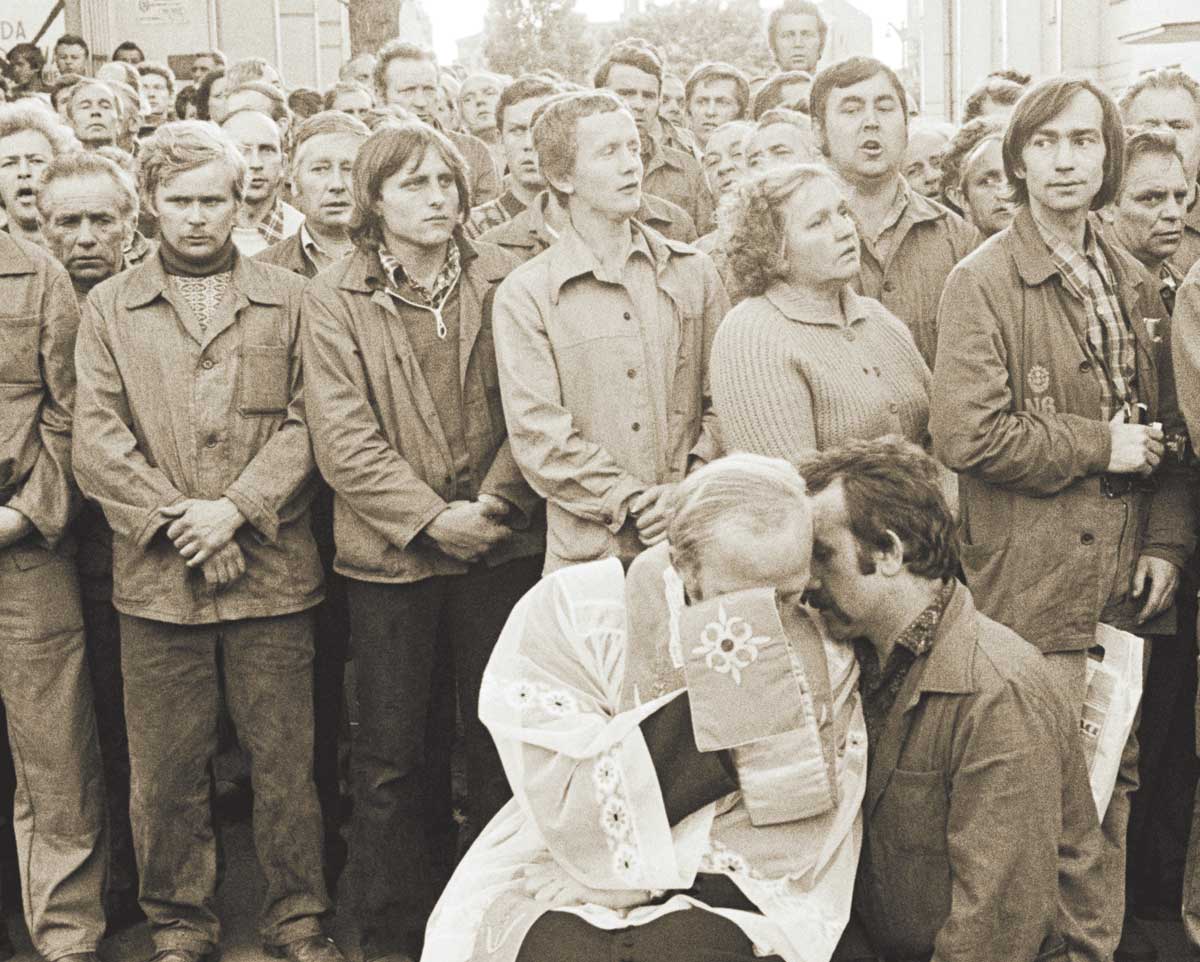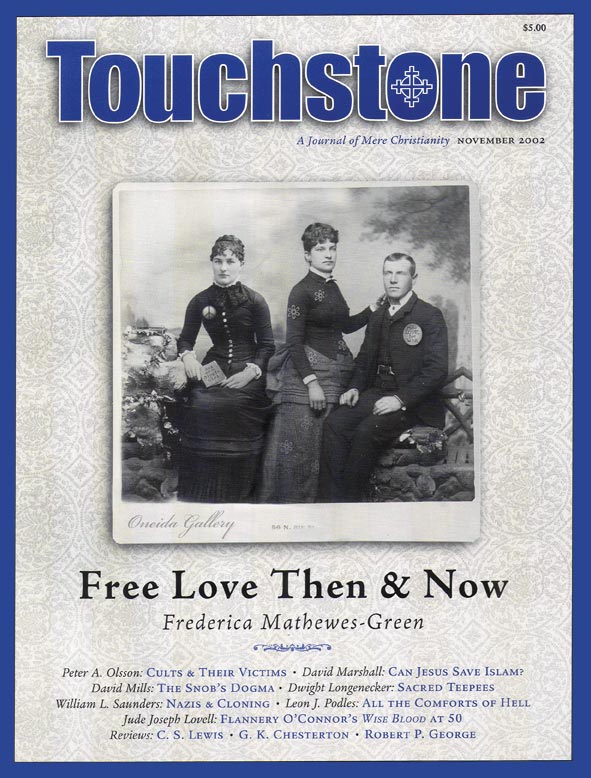The Ragged Figure
Jude Joseph Lovell on the 50th Anniversary of Flannery O’Connor’s Wise Blood
Just over fifty years ago, on May 15, 1952, a compact, alarmingly powerful first novel called Wise Blood was published with minimal fanfare by Harcourt, Brace and Company. The general public’s response to this bizarre fable about an outcast soldier in the Deep South who becomes an obsessive proponent of salvation without Jesus Christ was tepid. Of those few readers who did notice the novel, many of them came away from it baffled, perhaps even angered, at the urgently anti-Christian rages of its protagonist, the unforgettable Hazel Motes. In purely commercial terms, the novel was rejected.
Writers, however—particularly those with a Catholic or Christian worldview—immediately heard a mighty new voice sounding off in the wilderness. Novelist and critic Caroline Gordon famously wrote that the author’s “picture of the modern world” was “literally terrifying.” When she suggested to the well-known Catholic writer J. F. Powers that Wise Blood brought Franz Kafka to her mind, Powers, who had also read the book, disagreed. Kafka, he wrote back, was “much too young and tender to play in that league.”
The tiny hint of fear—whether competitive or existential—that can be detected in the response of these two established Catholic writers to Wise Blood is enough in itself to elicit admiration for the book’s effect. To earn respect of this caliber from one’s colleagues would seem to be the result of a seasoned, worldly, perhaps embittered old novelist’s finest effort, the product of a long life and career spent fine-tuning a sharp, dispassionate perspective on this world. But when the novelist in question was in fact a 26-year-old Catholic woman from rural Georgia, single, soft-spoken and physically fragile, the elements are in place for one of the most extraordinary and unlikely mysteries in the history of American letters.
Never in American literature had a vision of such penetrating insight and brutal honesty sprung forth from so improbable a provenance. Even the endless flow of critical studies and the unceasing application of such descriptive terms as “freakish,” “grotesque,” and “Southern Gothic” have failed to answer adequately the questions of who Flannery O’Connor really was and what she was really trying to say. We can still only speculate about what forces—divine in origin, perhaps—shaped the mind of a sickly girl from Georgia into a witty, cerebral artist who wrote with uncommon poise and power.
A Haunting Novel
What is it, then, that is so haunting about Wise Blood? The first indication is the sheer strangeness of its plot. A young, irritable war veteran, Hazel Motes, scarred in both literal and figurative terms, returns from the battlefield to his home state of Georgia to do things he “never [has] done before.” These turn out to be knocking around town for a while, following and fiercely debating a corrupt preacher and his manipulative daughter, and attempting to establish a church of his own called The Holy Church of Christ Without Christ, in which “the blind don’t see and the lame don’t walk and what’s dead stays that way.”
After numerous attempts to sow his angry and bitter seeds fail to yield any harvest, and a variety of comical encounters with another hapless exile named Enoch Emery fail to produce a “new jesus” [sic] on which to build his “church,” Hazel takes decisive action. He deliberately blinds himself, plunges headlong into the elements, and ends up dead, having been neglected by himself, the world, and, seemingly, God.
The first time I read the book, I was a soldier living in the state of Georgia, in my mid-twenties, and working on my understanding of those same three things: God, the world at large, and myself. I can remember being truly baffled by Wise Blood and asking myself where at any point in the book could I find the slightest evidence of love, forgiveness, Catholicism, or even of the woman herself who wrote the thing. I was convinced that these were not there: The novel had simply been misinterpreted.
What I could not grasp at the time was that the truths I was looking for, and that Flannery O’Connor was expressing in her novel, could be found only in the negative spaces. They were like expressions hidden on the reverse of the two-sided masks with which her characters were disguised. In the case of Hazel Motes, the more he attempts to conceal the presence of Christ within him with scowls and invective, the more his true identity as a child of God is recognized by other characters.
When, early in the novel, a taxi driver tells Hazel that his black hat makes him look like a preacher, Hazel denies it with venom. Yet the driver replies: “It ain’t only the hat. It’s a look in your face somewheres.” Later, the corrupt preacher Asa Hawks tells Hazel with a snicker, “some preacher has left his mark on you.” Hawks is later revealed to be a false witness, yet even he can identify the light of Christ in Hazel Motes. In Wise Blood, Christ lingers, unseen and yet recognizable, just behind the ineffective facade of human expression and behavior.
subscription options
Order
Print/Online Subscription

Get six issues (one year) of Touchstone PLUS full online access including pdf downloads for only $39.95. That's only $3.34 per month!
Order
Online Only
Subscription

Get a one-year full-access subscription to the Touchstone online archives for only $19.95. That's only $1.66 per month!
bulk subscriptions
Order Touchstone subscriptions in bulk and save $10 per sub! Each subscription includes 6 issues of Touchstone plus full online access to touchstonemag.com—including archives, videos, and pdf downloads of recent issues for only $29.95 each! Great for churches or study groups.
Transactions will be processed on a secure server.
more from the online archives

19.10—December 2006
Workers of Another World United
A Personal Commemoration of Poland’s Solidarity 25 Years Later by John Harmon McElroy
calling all readers
Please Donate
"There are magazines worth reading but few worth saving . . . Touchstone is just such a magazine."
—Alice von Hildebrand
"Here we do not concede one square millimeter of territory to falsehood, folly, contemporary sentimentality, or fashion. We speak the truth, and let God be our judge. . . . Touchstone is the one committedly Christian conservative journal."
—Anthony Esolen, Touchstone senior editor








